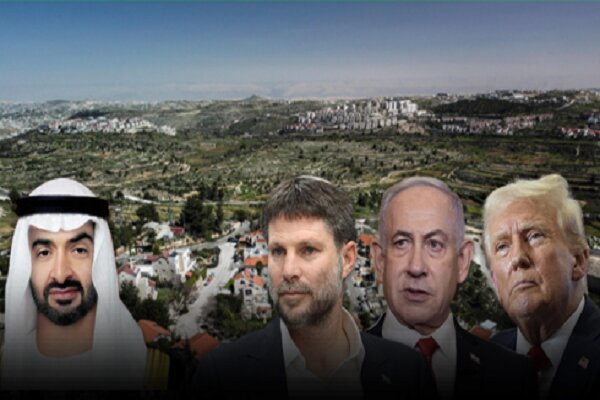West Bank Examines Claim: “Arabs Cannot Prevent the Gaza Tragedy

Mehr News Agency, International Desk: Ahead of the united Nations General Assembly in New York, France and Saudi arabia jointly held a meeting addressing the “two-state solution” and recognition of Palestine by predominantly Western and non-Arab states.Following this international campaign, major countries including Canada, Australia, Spain, and others joined. Israeli officials explicitly stated that they would continue their confrontational policies regarding the annexation of the West Bank and Gaza Strip within the announced timeframe. This intensified following a video release by Bezalel Smotrich unveiling the “E1” annexation plan in the West Bank. After far-right members of Netanyahu’s cabinet pushed for illegal land annexations in Palestinian territories, the United Arab emirates sent an official letter to Israel’s prime minister declaring that implementing such plans would mean ending normalization between Abu Dhabi and Tel Aviv.
The Hebrew newspaper The Jerusalem Post claimed on social media platform X that Saudi Arabia had taken a similar stance against Israel’s plan. Just 24 hours after Gulf Cooperation Council countries set a deadline forbidding any West Bank annexation moves, The Times of Israel reported that Netanyahu has removed West Bank annexation from his agenda.
In recent years, Arab states’ lack of decisive response to ongoing genocide in Gaza raised public doubts about whether gulf Cooperation Council members possess enough influence to pressure or impact Israeli policies.Recent developments demonstrate that when Sunni conservative states decide to act according to their power within Middle Eastern security arrangements, they can considerably affect key regional events.
The “Two-State Solution” as a Red Line
king Abdullah’s 2002 initiative from Saudi Arabia stands as one of the oldest Arab proposals aimed at resolving the Israeli-Palestinian conflict. Known later as the “Arab Peace Initiative,” it is founded on establishing two states-an autonomous Palestinian state alongside occupied territories based on pre-1967 borders-with East Jerusalem as its capital. King Abdullah emphasized full Israeli withdrawal from occupied lands including both West Bank and Gaza Strip while addressing palestinian refugees according to UN resolutions. This initiative also paved way for increased American security involvement in the region.the two-state idea underpins this proposal with firm conviction that lasting peace cannot be achieved without creating an independent Palestine.
Analysts believe this plan enjoys wide support across much of the Arab world and also some Western powers; it could serve as a roadmap for ending occupation if respected fully-though three decades of efforts enforcing UN Security Council resolutions reveal its fragility against Israel’s expansionist ambitions.Nonetheless,persistent expansionist actions like west Bank annexation challenge this initiative seriously. Recently expressed opposition by both UAE and Saudi Arabia reaffirms king Abdullah’s vision remains alive.
Thes countries stress adherence to two-state principles by threatening withdrawal from normalization processes with Israel if violations occur. This position reflects not only commitment to Palestinian rights but also forms part of broader strategies aimed at maintaining Middle Eastern stability through diplomatic solutions fostering economic cooperation while limiting tensions escalation.
However,
Israel’s reluctance toward serious negotiations continues threatening these efforts; for Israel’s war machine expanding occupation boundaries remains paramount over peace-building measures rooted in diplomacy.
From Alignment with Trump to Hostility Toward Muslim Brotherhood
As Sunni conservative powers in Middle East politics,
riyadh
and Abu Dhabi have firmly supported governance centered around Mahmoud Abbas-led Palestinian Authority controlling parts of West Bank territory.
This backing includes financial aid,
diplomatic pressure aiming at preventing land takeovers,
a key component reinforcing two-state framework.
Conversely,
Lesser attention is devoted toward Gaza under hamas control due largely
>due*>to ideological enmity stemming from Hamas’ affiliation with Muslim Brotherhood movement,*Saudi* &*UAE*, view them as ideological threats challenging their conservative governance models.
This rivalry extends through regional competitions influenced notably by Turkey & Iran backing hamas militarily & politically.
Synchronized cooperation with U.S., which designates Hamas terrorist group status, moves Riyadh & Abu dhabi toward prioritizing support for west Bank authorities protecting shared security & economic interests.
This strategy maintains regional Gulf stability while curbing expanding rival influences among Turkey & Iran aligned factions.
Within geopolitical rivalries shaping southern Gulf policies promote backing loyal leaderships like PA over Hamas-led enclave viewed ideologically destabilizing affiliations pose critical risks eroding authoritarian regimes internally. Such hostility originates partly from suppressed Muslim Brotherhood trends domestically leaving PA cooperation safer implementation path. *This competition further pressures Beyouty resisting Turkish President Erdogan’s use of Hamas influence extension across Islamic platforms, and Iranian military aid fueling southern borders surrounding Israel creating strategic tension rings. &&rellig;, these dynamics force crown princes Mohammed bin Salman (Saudi) & Mohammed bin Zayed (UAE) into focusing on balancing forces chiefly via stronger role supporting West Banks where they find feasible equilibrium points aligned with Washington’s anti-Hamas policy upholding Abraham Accords’ significant economic benefits.[regular]”.
This approach not only guards against escalated conflict inside Gaza but also lets mentioned Arab nations focus inwardly prioritizing energy security alongside core regional interests.
The Crux
The fact remains:Sunni conservative nations like Saudi Arabia & UAE if risen above sectarian or private agendas providing special focus on Gaza crisis-Israeli regime would never orchestrate such overt brutal massacres targeting women children Palestinians inside old city blocks inland dunes… Unquestionably sub-regional /cross-border projects dictated externally mainly Western US shaped powers diluted genuine Muslim obligations defending lives possessions honors fellow Muslims broadly universal accepted norms… Thus framing claims portraying ‘Arab impotence’ confronting current genocides insufficient properly substantiated since resolute steadfast stance rejecting Settlers nearing swift retreat witnessed Netanyahu abandoning far-right Zionists-driven unilateral plans promptly last weeks confirms substantive political gravitas these countries exert indeed previously underestimated rigor represents powerful potent tool capable altering troubling geopolitical patterns stark reality demands renewed extensive pragmatic reevaluation accords historic momentum currently risk squandering redundancies looms otherwise devastating consequences foreseeable horizon sooner delayed certain majority stake holders bear obligation circumstantial prevailing dilemmas mitigating ongoing human suffering calls vital concerted substantive collective measures urgently imperative ...
.


